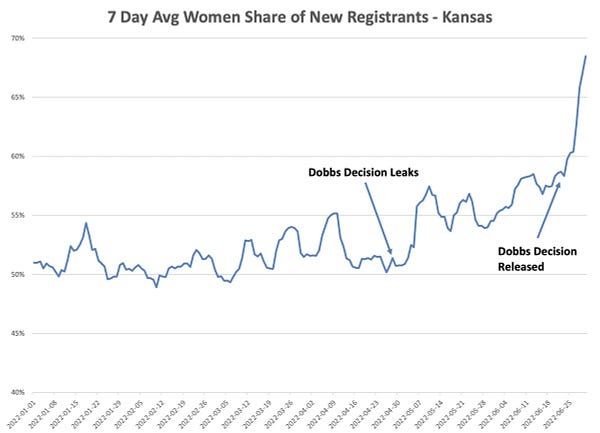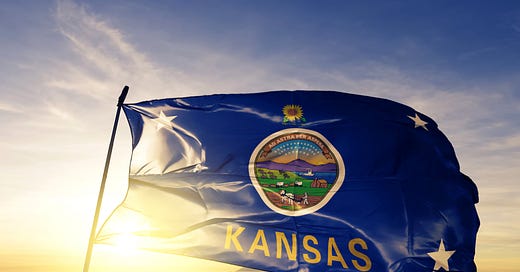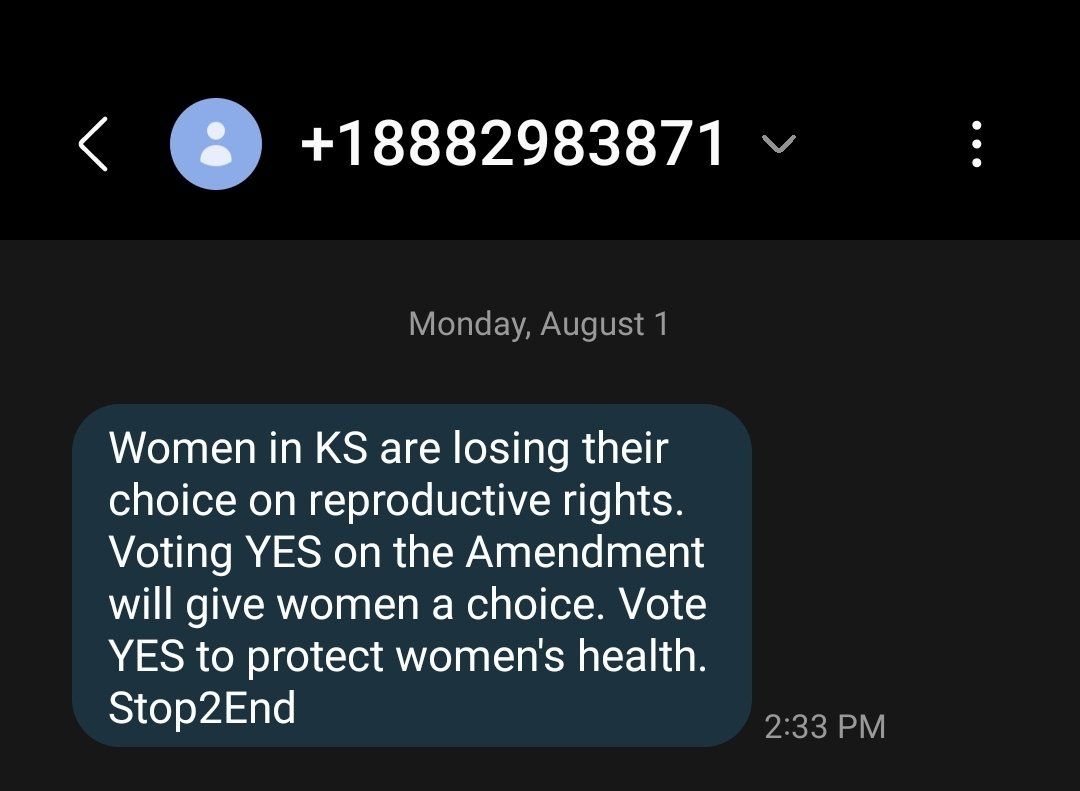
Discover more from Popular Information
In ruby-red Kansas, a state that voted for Trump in 2020 by a 15-point margin, anti-abortion forces developed an elaborate plan to clear the way for an abortion ban. The primary obstacle was a 2019 ruling by the Kansas Supreme Court that "the Kansas Constitution Bill of Rights protects a woman's access to abortion." So, to ban abortion in Kansas, the Kansas Constitution needs to be amended.
Kansas' Republican-dominated legislature took the first step by approving a Constitutional amendment. But, to take effect, the amendment needed to be approved by the voters. Notably, the legislature scheduled the vote on the Amendment for Tuesday's primary election.
Why would members of the legislature schedule a vote on a proposed Constitutional amendment for a primary election? In Kansas, primary elections are closed, meaning normally only registered Republicans and Democrats vote. And in Kansas, registered Republicans (851,882) vastly outnumber Democrats (495,574). Registered independents in Kansas (560,309) could vote on the Constitutional amendment but aren't in the habit of showing up to primaries. Further, in the high-profile Governor's race, incumbent Laura Kelly (D) was running unopposed.
So the anti-abortion legislators behind the Constitutional amendment were hoping for a smaller electorate that was skewed toward opponents of abortions rights.
Then, they made the text of the Constitutional amendment itself incredibly confusing:
Because Kansans value both women and children, the constitution of the state of Kansas does not require government funding of abortion and does not create or secure a right to abortion. To the extent permitted by the Constitution of the United States, the people, through their elected state representatives and state senators, may pass laws regarding abortion, including, but not limited to, laws that account for circumstances of pregnancy resulting from rape or incest, or circumstances of necessity to save the life of the mother.
The proposed text makes it seem like the Kansas government funds abortions, which it does not. It also makes it seems like voting for the proposed amendment means voting in favor of allowing abortion in cases of rape, incest, or life of the mother. But that isn't true either. The impact of the proposed amendment would be to allow the legislature to ban abortion, with no requirement that the ban include any exceptions.
If that wasn't confusing enough, a PAC run by former Kansas Congressman Tim Huelskamp (R) sent out deceptive text messages to Kansas voters falsely stating that voting YES would protect abortion rights.
Huelskamp's group, the Do Right PAC, spent more than $200,000 supporting the proposed Constitutional amendment, according to a July 18 filing.
None of these tactics, however, worked. The proposed Constitutional amendment was defeated 58.8% to 41.2% — more than a 17% margin. It did not just fail to pass. It was resoundingly rejected.
What happened? First, the efforts to keep turnout low were entirely unsuccessful. In the 2018 midterms, 473,000 Kansans voted. But more than 900,000 people voted for or against the Constitutional amendment on abortion. The turnout was much closer to what Kansas sees in a general election.
Kansas also saw a surge of new female registrants as election day approached, particularly after the Supreme Court overturned Roe.


The number of people who voted against the Constitutional amendment (534,134) exceeded the combined number of Democrats who voted in the primary and independents who just voted on the Constitutional amendment (445,155). That means that a significant number of Republican voters — in excess of 20% — also opposed clearing the way for an abortion ban.
The lesson of Kansas is that reproductive rights can motivate voters, even in red states, to turn out. And these voters have a sophisticated understanding of the issues and are not easily deceived by dirty tricks.
What we can learn from states that have already banned abortion
Kansas was also the first state to vote directly on abortion rights after the Supreme Court overturned Roe. Kansans had a chance to observe the impact of abortion bans in other states. Here is some of what has happened:
1. A 10-year-old rape victim was forced to travel from Ohio to Indiana to obtain an abortion.
2. A woman in Texas carrying a non-viable fetus was forced to endure severe pain for days because doctors, fearful of prosecution, would not terminate her pregnancy.
3. In Wisconsin, "a woman bled for more than 10 days from an incomplete miscarriage after emergency room staff would not remove the fetal tissue amid a confusing legal landscape that has roiled obstetric care."
4. Pharmacists in numerous states are refusing to fill prescriptions for Methotrexate, "one of the most commonly prescribed drugs for inflammatory forms of arthritis," because the drug can also sometimes be used to end a pregnancy.
Kansans, which is surrounded by states banning abortion, overwhelmingly decided this was not for them.
UPDATE: Patagonia CEO calls out corporations for climate hypocrisy
Earlier this week, Popular Information reported that most corporations that claim to be committed to combating climate change have remained silent on the Inflation Reduction Act, which includes historic investments to decarbonize the economy. Meanwhile, corporate lobbying groups like the U.S. Chamber of Commerce and the Business Roundtable, which represent most major corporations, are trying to defeat the legislation.
On Wednesday, Patagonia CEO Ryan Gellert called out corporations for saying the right things about climate change while letting corporate lobbying groups "do their dirty work":
[B]oth the U.S. Chamber of Commerce and the Business Roundtable are trying to block the will of the people and our government from making meaningful progress because the organizations don’t want their members to pay their fair share of taxes. The Inflation Reduction Act calls for a domestic corporate minimum tax rate of 15% applied to companies with revenue of more than $1 billion…
Many companies that belong to these organizations talk a big game on climate — just look at their websites. They should no longer remain silent while the Chamber and Business Roundtable do their dirty work. If you talk about how your company is going to protect the planet, you need to pay your fair share to help scale solutions for things like clean power, transportation and manufacturing. It’s time for the business community to unite in support of the Inflation Reduction Act.
You can read Gellert's full post, which he published on LinkedIn, here.
Subscribe to Popular Information
Independent accountability journalism.











I lived in Kansas for 20 plus years before leaving the country last month. I was shocked that the no vote won. Shocked! As were many. This article is the best one yet written about the shenanigans that went on during that vote, and yet the people's will prevailed. If it could happen in Kansas, there is hope for the rest of the country. Not just on abortion issues, but in general.
I live in Vermont. We will soon have the same vote to cast. I have shared your analysis with the people I am working with to make sure Vermont follows Kansas. Thank you. Great journalism